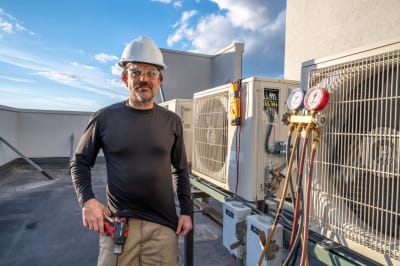Plumbing as a career should be an appealing option for anyone in Minnesota who loves breaking down mechanical components and understanding how complex systems work. Additionally, the state has made it easier for aspiring plumbers here to begin their careers as quickly and efficiently as possible.
Those who understand the process early have a higher chance of enjoying a long and successful career in the field. To that end, we have provided a detailed guide highlighting the most important considerations in starting a career as a plumber in Minnesota.
We start by exploring the general education and certification requirements for better career opportunities. Candidates will also discover possible licensure requirements and the top destinations to receive plumbing training in the state.
Lastly, we round up the guide with an overview of the salary projections, depending on several important factors.
How to Become a Plumber in Minnesota
The following are the considerations needed to become a plumber in Minnesota.
Foundational Requirements
Most states, including Minnesota, will set a few foundational requirements for skilled trade workers. In Minnesota, these include the provision that candidates must be at least 18 years old and possess a high school diploma or GED.
Aspiring plumbers must also be able to read and write the English language proficiently and be physically fit to perform their duties.
Academic Requirements
Future plumbers in Minnesota may attend an academic program to kick-start their careers. These programs incorporate both a classroom element and a hands-on training element into their curriculum.
Candidates who choose this route also have the luxury of earning a certificate or associate degree, which may increase their appeal to potential employers.
Apprenticeship Requirements
The state of Minnesota allows candidates to start their careers through apprenticeships. These are typically offered by trade unions, but professional organizations can also run accredited apprenticeship programs.
Candidates enjoy hands-on training and possible mentorship from established professionals.
Certification & Employment
Lastly, candidates who have completed the above steps may consider the certification and licensing requirements below before seeking employment from relevant establishments in the state. Candidates may also opt to get a contractor license and start their own business.
Explore Trades with Similar Paths
Licensure & Certification Requirements
Before they can secure employment and do plumbing work in the state, plumbers in Minnesota must obtain a license. They must register as a candidate in training and acquire on-the-job experience working under a licensed supervisor.
After 4 years of such work, they may take the journeyman plumber examination to acquire their journeyman license. Those who have worked a year as journeyman plumbers may take the master plumber examination to acquire their master plumber license.
The Minnesota Department of Labor and Industry is responsible for setting laws and regulations for plumbers in the state. Apart from state licensure, St. Paul and Minneapolis candidates must also register locally.
The Minneapolis Construction Code Service and the Saint Paul Department of Safety and Inspection oversee local certification for plumbers in these areas. They have reciprocity agreements, so plumbers in Saint Paul do not need additional registration in Minneapolis and vice versa.
Top Plumbing Schools in Minnesota
Aspiring plumbers in Minnesota may consider the following destinations for quality training in the state.
Minnesota State Community & Technical College
Minneapolis, MN Online + Campus
Minnesota State Community & Technical College offers a hands-on training program for aspiring plumbers in the state. It teaches topics such as pipe fitting and fixtures installation, blueprint reading, codes, and materials.
Tuition
$5,441 - $5,556Contact
enroll@minnesota.edu
(877) 450 - 3322
Hennepin Technical College
Brooklyn Park, MN Online + Campus
Hennepin Technical College provides valuable plumbing training with the opportunity to secure on-the-job training with top establishments nationwide. Students learn key topics such as piping procedures, material identification, blueprint reading and design, and plumbing systems.
Tuition
$178 - $279 per CreditContact
(952) 995-1300
Info@HennepinTech.edu
Plumbers Local 15
Maple Grove, MN Campus Only
Aspiring plumbers in Minnesota looking for top-quality apprenticeship programs may opt for the one offered by Plumbers Local 15.
Tuition
$650 - $750Contact
(888) 333-8965
Explore Plumbing Schools in Minnesota by City:
Salary & Career Outlook
A plumber in Minnesota who falls around the midpoint of earners can expect to earn an annual average salary of $71,918, the same as the national average. If factors like experience, location, and establishment type are in the plumber’s favor, they can earn as high as $114,255 and be among the top 10%.
Those on the lower end of these conditions (the bottom 10%) still earn an annual average salary of $45,268.
Saint Paul and South Saint Paul are the top-paying locations for plumbers in Minnesota, with annual average salaries of $140,952 and $112,425, respectively.
Coon Rapids, with an annual average salary of $100,000, Rochester, with an annual average salary of $95,013; and Maple Grove, with an annual average salary of $89,383, complete the top five.





